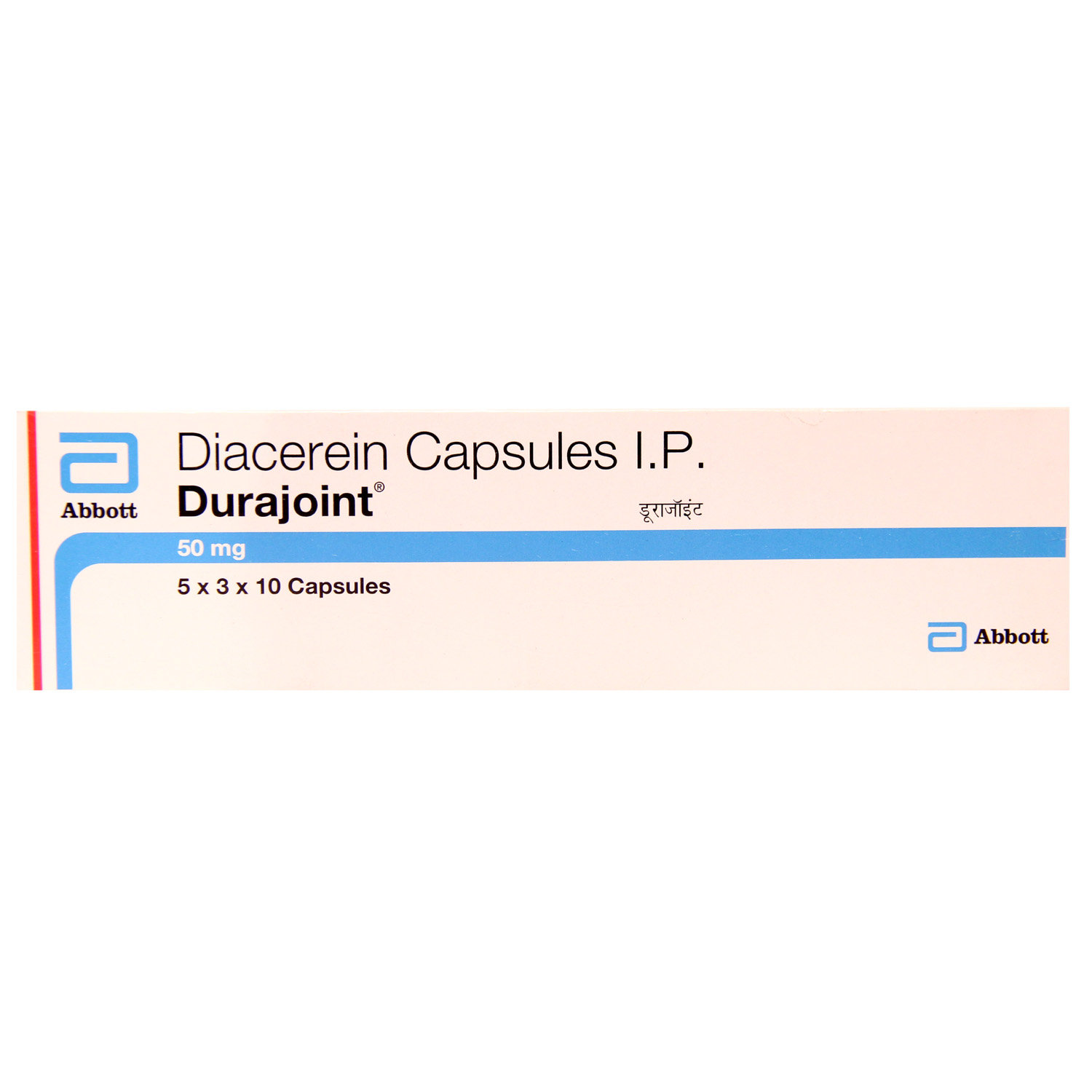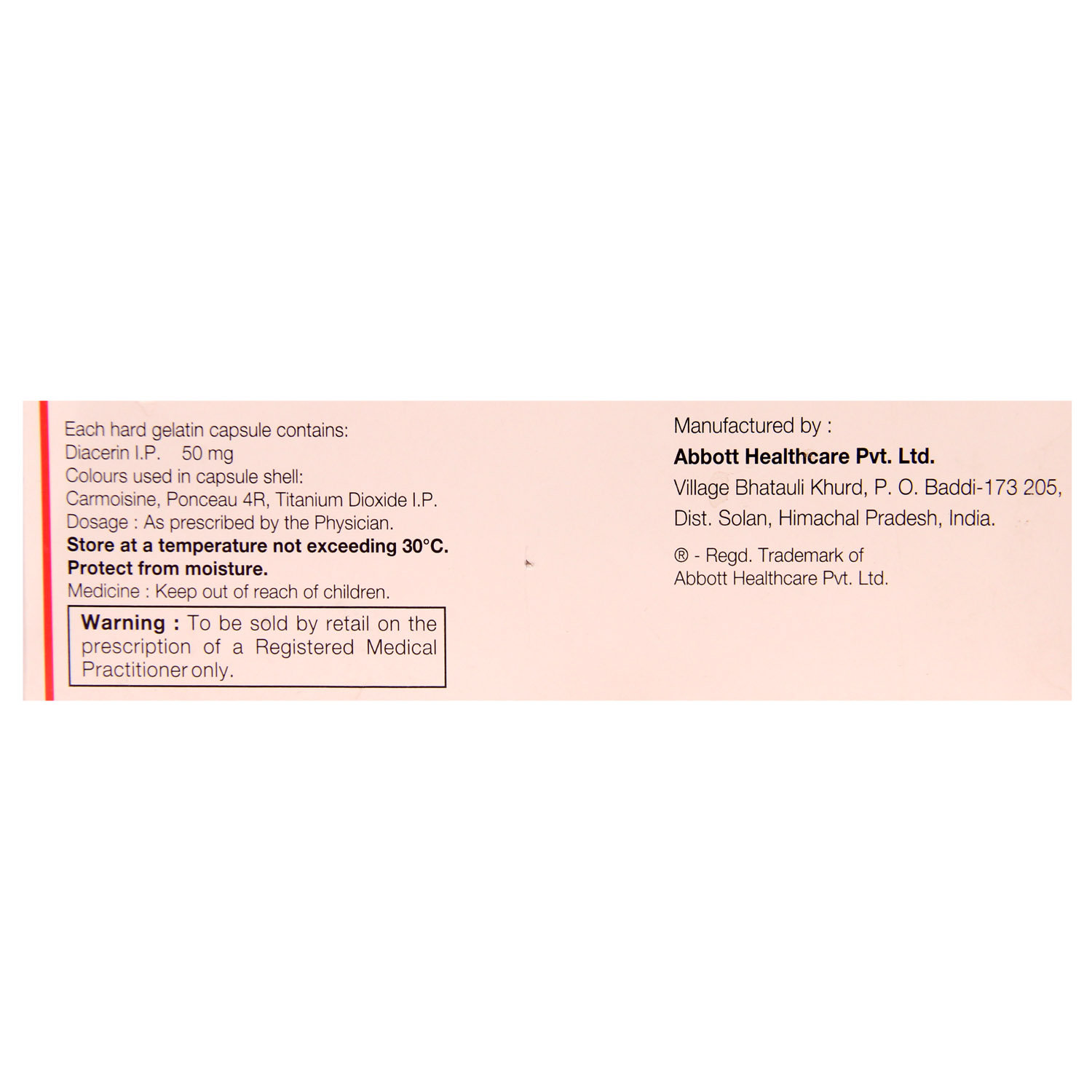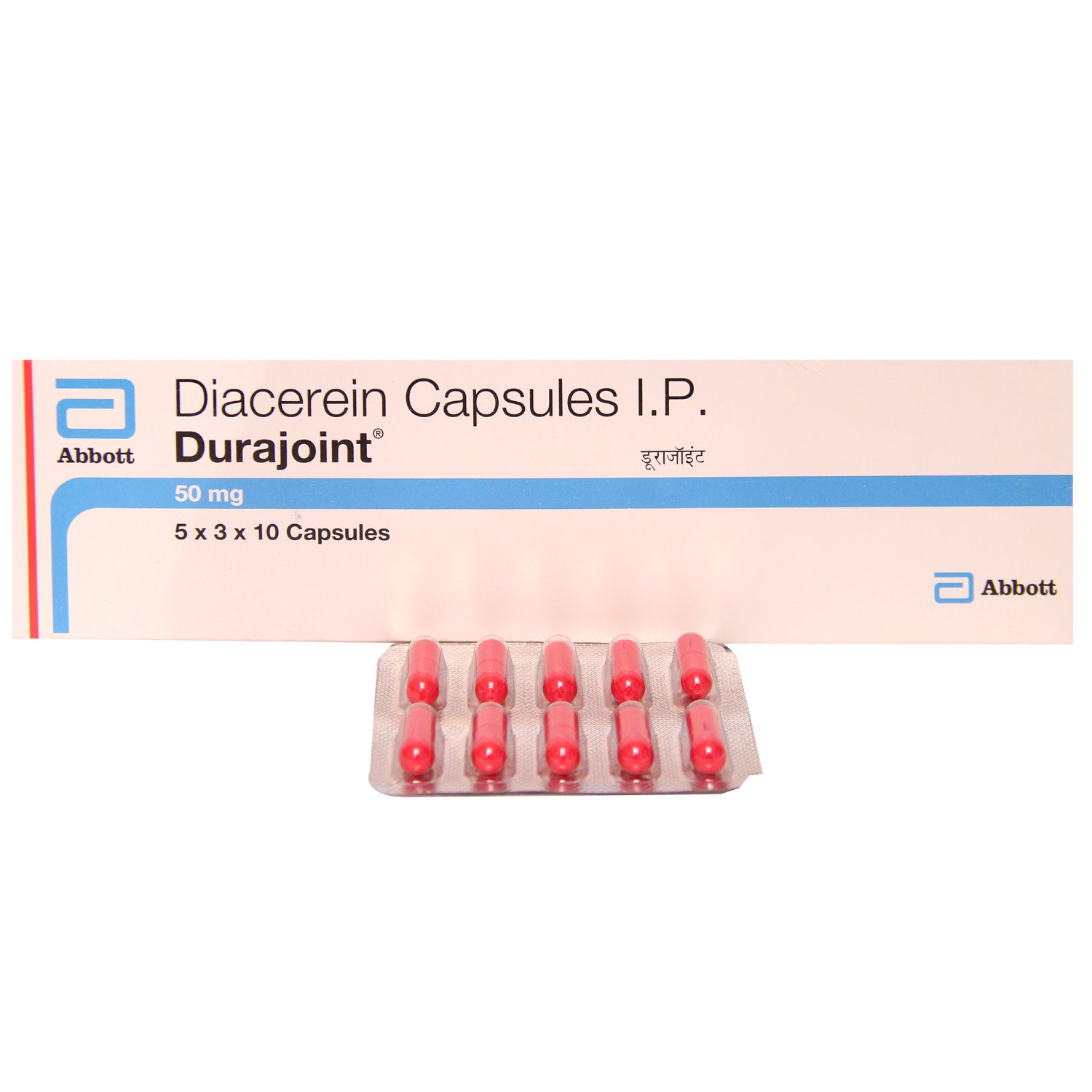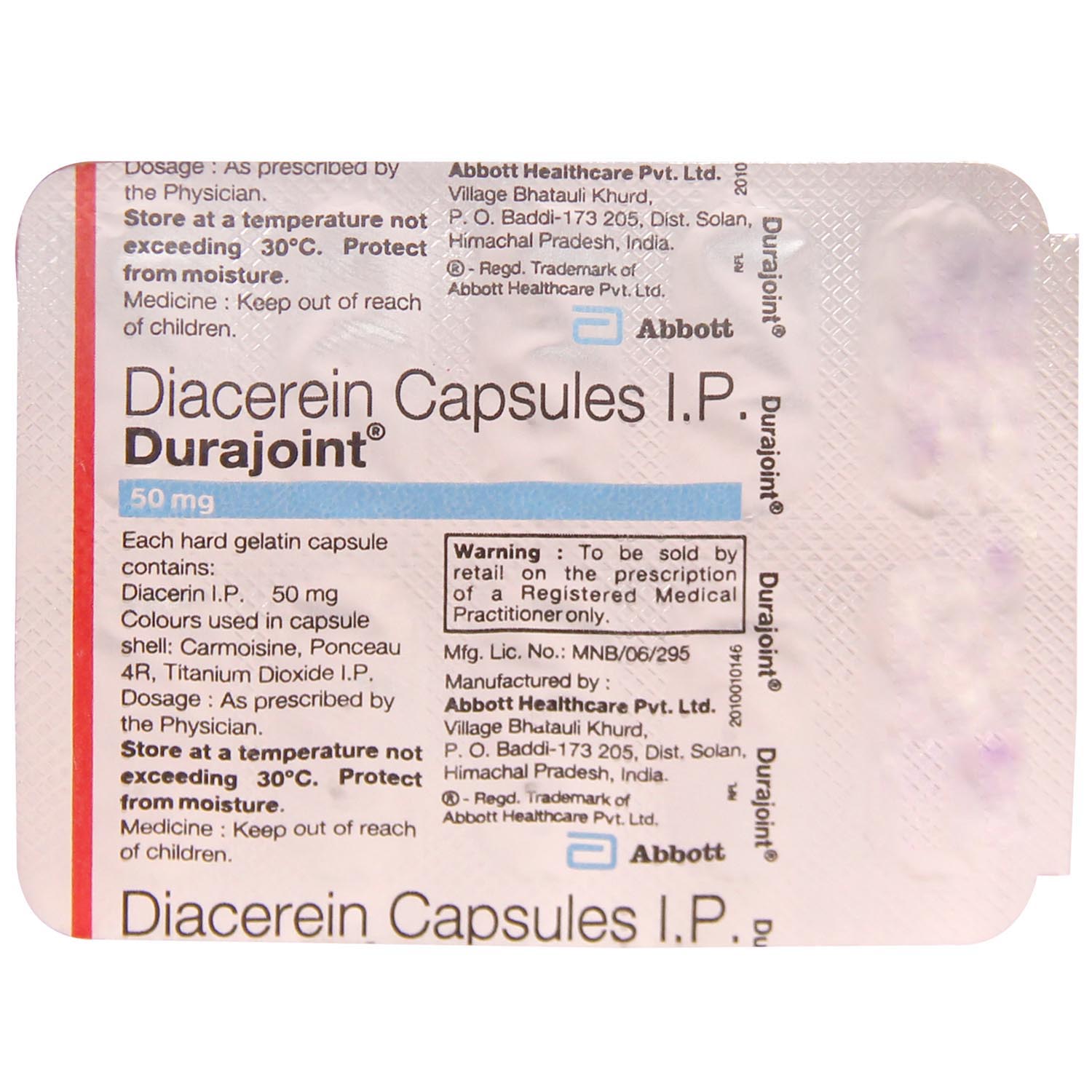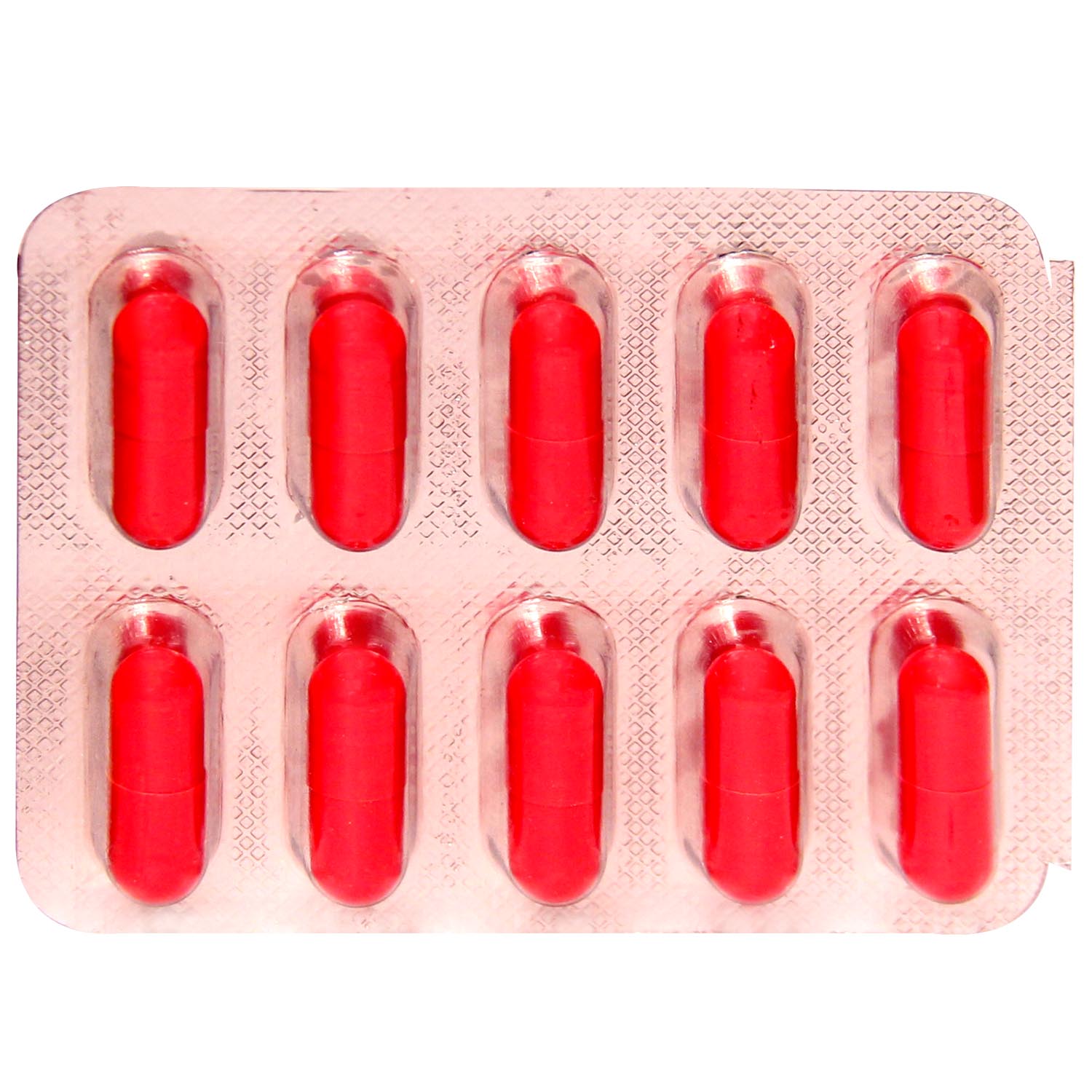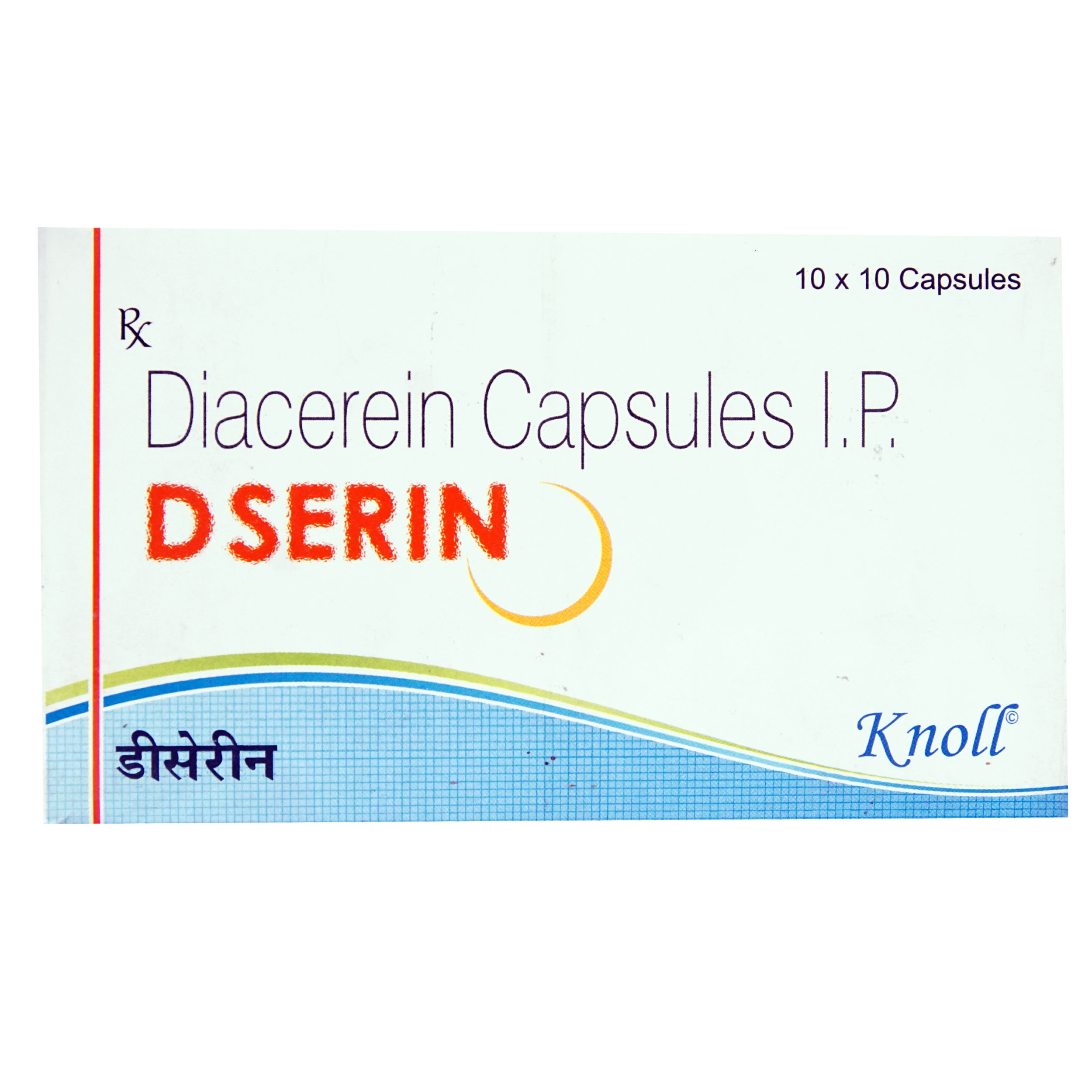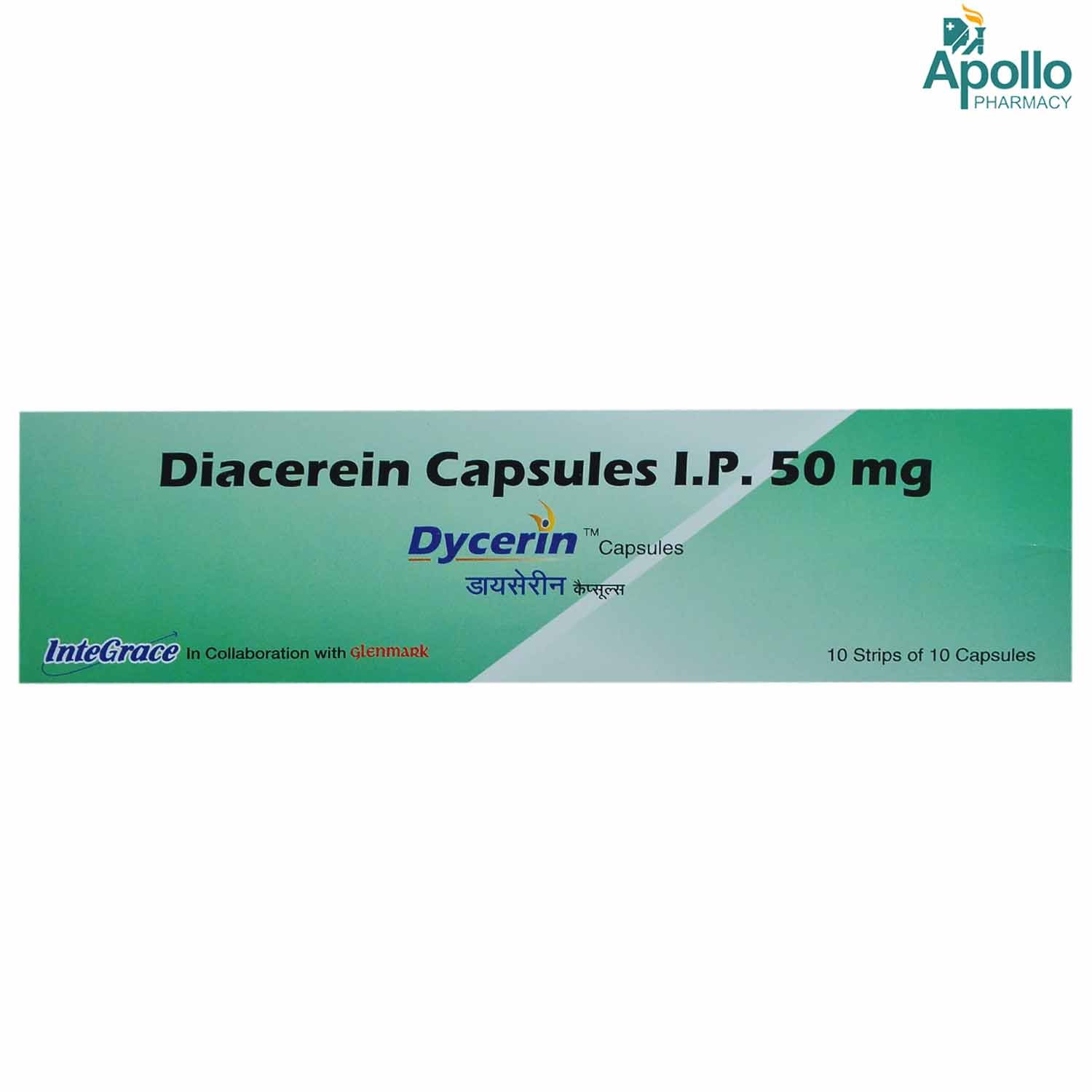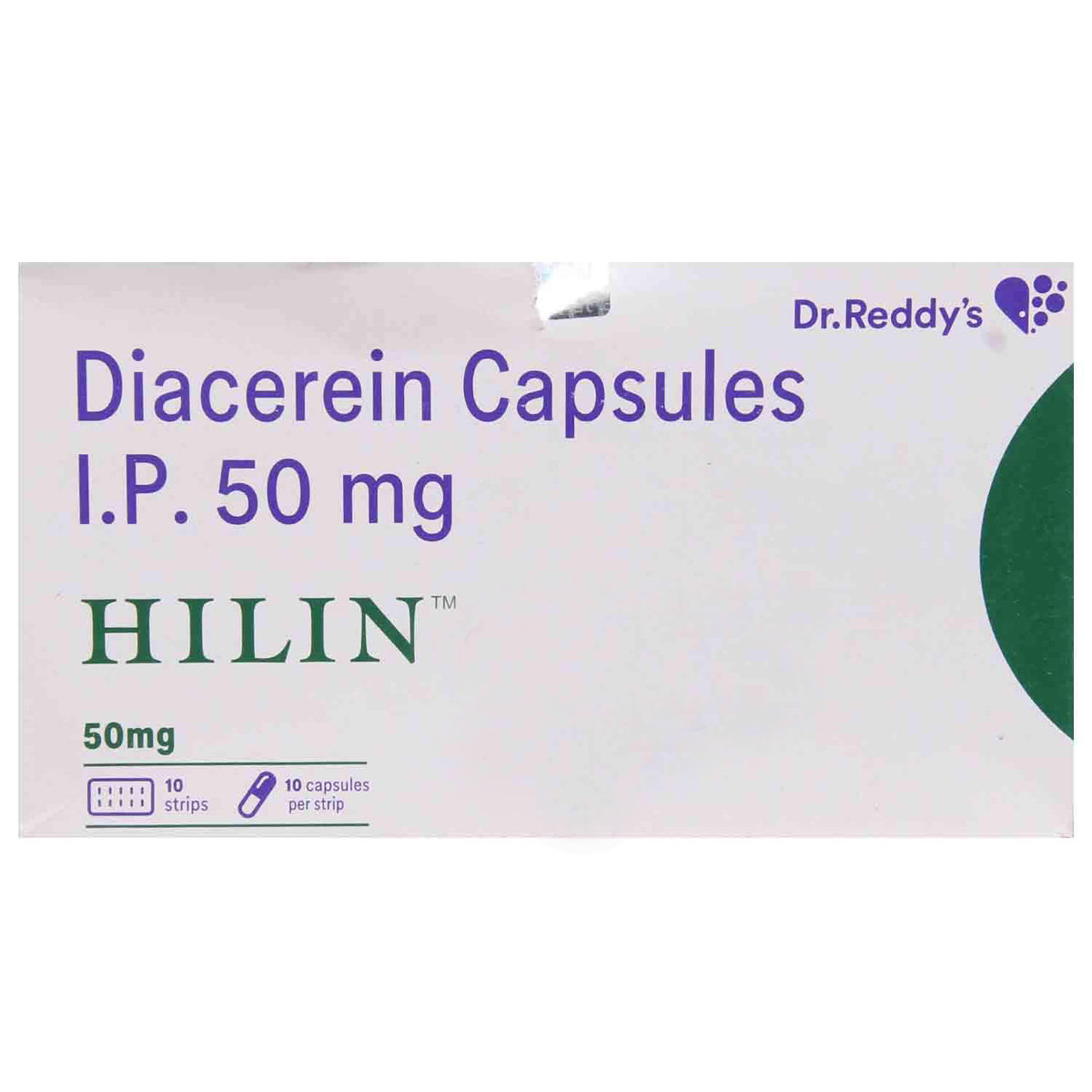Durajoint Capsule 10's
MRP ₹359
(Inclusive of all Taxes)
₹43.1 Cashback (12%)
Provide Delivery Location
Online payment accepted
 Prescription drug
Prescription drugWhats That
Composition :
Manufacturer/Marketer :
Consume Type :
Expires on or after :
Return Policy :
About Durajoint Capsule
Durajoint Capsule belongs to a class of medications called anthraquinones used to treat pain, stiffness, and swelling in joints caused by osteoarthritis. Osteoarthritis is a degenerative joint disease in which the two ends of the joints come together due to the breakdown of a protective covering of cartilage. Due to the absence of this protective covering, the joints rub against each other, leading to pain and stiffness.
Durajoint Capsule contains Diacerein which works by inhibiting the action of a protein involved in the inflammation and destruction of cartilage. Thereby, it helps to build and repair the cartilage (the soft connective tissue that protects and covers the ends of long bones at the joints) and reduces pain and swelling in the joints.
Take Durajoint Capsule as prescribed by your doctor. You are advised to take Durajoint Capsule for as long as your doctor has prescribed it for you based on your medical condition. In some cases, you may experience diarrhea, stomach pain, flatulence (gas), skin rash, or itching. Most of these side effects of Durajoint Capsule do not require medical attention and gradually resolve over time. However, if the side effects persist or worsen, please consult your doctor.
If you are allergic to Durajoint Capsule or any other medicines, please tell your doctor. Durajoint Capsule is not recommended for children below 15 years of age and it should be used with caution in elderly patients above 65 years of age. Avoid taking Durajoint Capsule if you are pregnant or breastfeeding and consult a doctor before taking Durajoint Capsule . Avoid consumption of alcohol with Durajoint Capsule as it may increase the risk of liver damage. You are recommended not to take more than the prescribed dose as it may cause a Durajoint Capsule overdose and lead to severe diarrhea.
Uses of Durajoint Capsule
Directions for Use
Key Benefits
Durajoint Capsule contains Diacerein that blocks the action of a protein involved in the inflammation and destruction of cartilage. Thereby, it helps to build and repair the cartilage (the soft connective tissue that protects and covers the ends of long bones at the joints) and reduces pain and swelling in the joints.
Storage
- Inform Your Doctor: Notify your doctor immediately about your diarrhoea symptoms. This allows them to adjust your medication or provide guidance on managing side effects.
- Stay Hydrated: Drink plenty of fluids to replace lost water and electrolytes. Choose water, clear broth, and electrolyte-rich drinks. Avoid carbonated or caffeinated beverages to effectively rehydrate your body.
- Follow a Bland Diet: Eat easy-to-digest foods to help firm up your stool and settle your stomach. Try incorporating bananas, rice, applesauce, toast, plain crackers, and boiled vegetables into your diet.
- Avoid Trigger Foods: Steer clear of foods that can worsen diarrhoea, such as spicy, fatty, or greasy foods, high-fibre foods, and dairy products (especially if you're lactose intolerant).
- Practice Good Hygiene: Maintain good hygiene to prevent the spread of infection. To stay healthy, wash your hands frequently, clean and disinfect surfaces regularly, and avoid exchanging personal belongings with others.
- Take Anti-Diarrheal Medications: If your doctor advises, anti-diarrheal medications such as loperamide might help manage diarrhoea symptoms. Always follow your doctor's directions.
- Keep track of your diarrhoea symptoms. If they don't get better or worse or are accompanied by severe stomach pain, blood, or dehydration signs (like extreme thirst or dark urine), seek medical help.
- Inform Your Doctor: Notify your doctor immediately about your diarrhoea symptoms. This allows them to adjust your medication or provide guidance on managing side effects.
- Stay Hydrated: Drink plenty of fluids to replace lost water and electrolytes. Choose water, clear broth, and electrolyte-rich drinks. Avoid carbonated or caffeinated beverages to effectively rehydrate your body.
- Follow a Bland Diet: Eat easy-to-digest foods to help firm up your stool and settle your stomach. Try incorporating bananas, rice, applesauce, toast, plain crackers, and boiled vegetables into your diet.
- Avoid Trigger Foods: Steer clear of foods that can worsen diarrhoea, such as spicy, fatty, or greasy foods, high-fibre foods, and dairy products (especially if you're lactose intolerant).
- Practice Good Hygiene: Maintain good hygiene to prevent the spread of infection. To stay healthy, wash your hands frequently, clean and disinfect surfaces regularly, and avoid exchanging personal belongings with others.
- Take Anti-Diarrheal Medications: If your doctor advises, anti-diarrheal medications such as loperamide might help manage diarrhoea symptoms. Always follow your doctor's directions.
- Keep track of your diarrhoea symptoms. If they don't get better or worse or are accompanied by severe stomach pain, blood, or dehydration signs (like extreme thirst or dark urine), seek medical help.
- Drink water or other clear fluids.
- To prevent worsening of pain, limit intake of tea, coffee, or alcohol.
- Include bland foods like rice, toast, crackers, and rice in your diet.
- Avoid lying down immediately after eating as it may cause indigestion or heartburn.
- Avoid acidic and spicy food as it may cause indigestion.
- Include omega-3 rich foods in your diet to reduce inflammation.
- Eat antioxidant-rich foods like fruits, vegetables, and nuts to promote overall skin health.
- Stay hydrated by drinking plenty of water.
- Maintain a healthy skin care routine, using gentle, fragrance-free products.
- Wear loose, breathable clothing to minimize irritation.
- Keep fingernails short and clean to prevent further skin damage.
- Use a humidifier to add moisture to the air, reducing dryness and itchiness.
- Practice stress-reducing techniques like meditation or deep breathing to manage stress levels.
- Consume fruits and vegetables more.
- Include lean protein sources like legumes, poultry, and fish.
- Avoid uncooked shellfish due to hepatitis A risk.
- Follow the Mediterranean diet, more fruits, veggies, whole grains, nuts, and legumes.
- Less red meat and sweets/added sugars.
- Take prescribed vitamins and medicines for low blood count, nerve problems, or nutritional issues.
- Inform your doctor about the nausea and discuss possible alternatives to the medication or adjustments to the dosage.
- Divide your daily food intake into smaller, more frequent meals to reduce nausea.
- Opt for bland, easily digestible foods like crackers, toast, plain rice, bananas, and applesauce.
- Avoid certain foods that can trigger nausea, such as fatty, greasy, spicy, and smelly foods.
- Drink plenty of fluids, such as water, clear broth, or electrolyte-rich beverages like coconut water or sports drinks.
- Use ginger (tea, ale, or candies) to help relieve nausea.
- Get adequate rest and also avoid strenuous activities that can worsen nausea.
- Talk to your doctor about taking anti-nausea medication if your nausea is severe.
- Record when your nausea occurs, what triggers it, and what provides relief to help you identify patterns and manage your symptoms more effectively.
Drug Warnings
If you are allergic to Durajoint Capsule or any other medicines, please tell your doctor. Durajoint Capsule is not recommended for children below 15 years of age and it should be used with caution in elderly patients above 65 years of age. Avoid taking Durajoint Capsule if you are pregnant or breastfeeding and consult a doctor before taking Durajoint Capsule . If you have glucose or galactose malabsorption syndrome, congenital galactosemia, or lactase deficiency, inform your doctor as Durajoint Capsule contains lactose. You are recommended to regularly exercise to strengthen muscles and manage weight. Avoid consumption of alcohol with Durajoint Capsule as it may increase the risk of liver damage. You are recommended not to take more than the prescribed dose as it may cause a Durajoint Capsule overdose and lead to severe diarrhea.
Drug-Drug Interactions
Drug-Drug Interactions
Login/Sign Up
Drug-Food Interactions
Drug-Food Interactions
Login/Sign Up
Diet & Lifestyle Advise
- Physical activity helps in strengthening muscles and relieves joint stiffness. Gentle activities like 20-30minutes of walking or swimming would be helpful.
- Performing yoga may also help in improving joint flexibility and pain management.
- Maintain a healthy weight by performing regular low-strain exercises and eating healthy food.
- Get adequate sleep as resting the muscles can help in reducing inflammation and swelling.
- Follow heat or cold therapy, and apply a cold or hot compress on the joints for 15-20minutes regularly.
- Acupuncture, massage, and physical therapy may also be helpful.
- Eat foods rich in antioxidants such as berries, spinach, kidney beans, dark chocolate, etc.
- Foods containing flavonoids such as soy, berries, broccoli, grapes, and green tea help in reducing inflammation.
- Avoid smoking and alcohol consumption.
Side Effects of Durajoint Capsule
- Diarrhoea
- Stomach pain
- Flatulence (gas)
- Skin rash
- Itching
Habit Forming
Therapeutic Class
All Substitutes & Brand Comparisons
RX
Out of StockBetacerin 50mg Capsule
Betamax Remedies Pvt Ltd
₹78
(₹7.02 per unit)
77% CHEAPERRX
Out of StockArilex 50mg Capsule
Alembic Pharmaceuticals Ltd
₹84.6
(₹7.61 per unit)
75% CHEAPERRX
Out of StockDy 50mg Capsule
₹85
(₹7.65 per unit)
75% CHEAPER
Author Details
We provide you with authentic, trustworthy and relevant information
Drug-Diseases Interactions
Drug-Diseases Interactions
Login/Sign Up
FAQs
Drug-Drug Interactions Checker List
- FUROSEMIDE
- HYDROCHLOROTHIAZIDE
- DIGOXIN
- DIGITOXIN
Special Advise
You are recommended to maintain a time gap of a minimum of 2 hours between taking Durajoint Capsule and antacids containing calcium, aluminium, or magnesium salts as taking these medicines at the same time may decrease the absorption of Durajoint Capsule .
Disease/Condition Glossary
Osteoarthritis: It is a degenerative joint disease in which the two ends of the joints come together due to the breakdown of a protective covering of cartilage. Due to the absence of this protective covering, the joints rub against each other, leading to pain and stiffness. Symptoms of osteoarthritis include pain, stiffness, inflammation, and tenderness. The main reason for osteoarthritis is age, the older you are, the more likely you could get osteoarthritis, thus known as degenerative disease, meaning that the joints wear out as a person ages. Other reasons include a past injury such as torn cartilage, dislocated joints, and ligament injuries.

Have a query?
Alcohol
Safe if prescribed
Avoid consumption of alcohol with Durajoint Capsule as it may increase the risk of liver damage.
Pregnancy
Consult your doctor
Durajoint Capsule is contraindicated in pregnant women. However, please consult a doctor if you are pregnant.
Breast Feeding
Consult your doctor
Durajoint Capsule may be excreted in breast milk. Therefore, Durajoint Capsule is not recommended for breastfeeding mothers. Please consult a doctor if you are breastfeeding.
Driving
Safe if prescribed
Drive only if you are alert after taking Durajoint Capsule .
Liver
Consult your doctor
Durajoint Capsule is not recommended for patients with liver disease. However, please consult a doctor if you have any concerns regarding this.
Kidney
Consult your doctor
Take Durajoint Capsule with caution, especially if you have a history of Kidney diseases/conditions. The dose may be adjusted by your doctor as required.
Children
Safe if prescribed
Durajoint Capsule is not recommended for children below 15 years of age.

